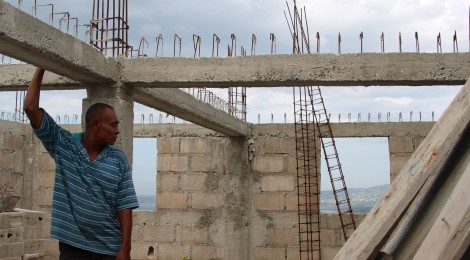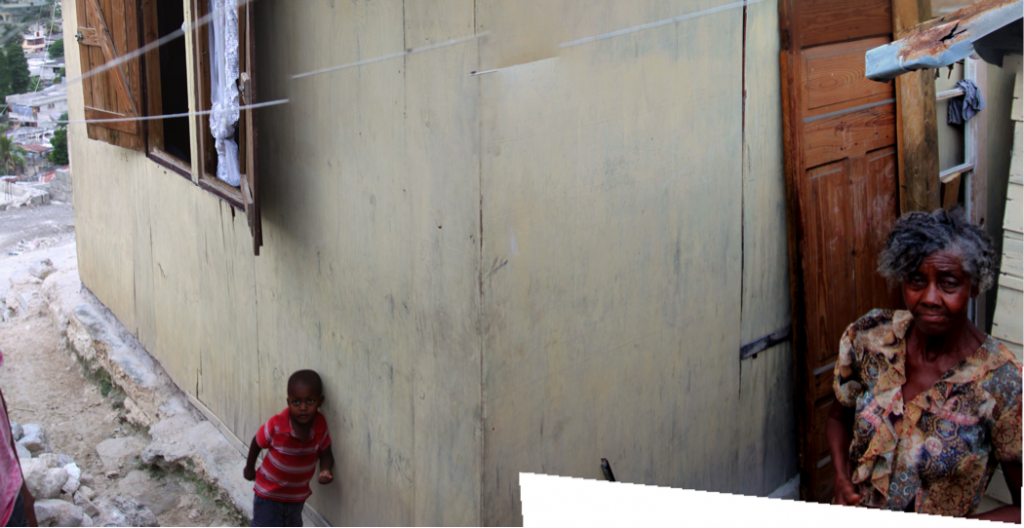
Rekanpe tet’w: Voices from Haiti on recovery
Rekanpe tet’w literally means “re-standing your head,” and refers to the process taken by Haitians to recover after the earthquake. The following quotes are excerpts taken from interviews conducted while I was researching in Port au Prince this summer on self-recovery mechanisms in reconstruction. These quotes were taken from focus groups with community leaders and household interviews in Carrefour (all translations are my own, so apologies for any mistakes in my Kreyol!).
– – – –
Lè nou pale de prevansyon, si pèp la te konnen sa tranblemantè a ye, pa tap gen tout kadav sa yo. Leta pa fè edikasyon pèp la sou sa yo rele tranblemantè a pou li di l men kouman pou li aji. Okontrè gen moun ki kouri soti aprè sa li kouri antre ankò paske li pa konn sa sa ye. Si Leta te pran responsablite pa l nan sans sa, mwen pa kwè tout moun sa yo tap mouri. E, mwen ret kwè ke jouk jounen jodi a pèp la pa konnen vrèman sa tranblemantè a ye.
When we speak of prevention- if people had really known what an earthquake was, we would not have had all of those corpses. The state never educated people on what an earthquake was and how to react to one. On the contrary, there were people who ran outside and then ran right back inside because they didn’t know what was going on. If the state had taken responsibility for itself in this regard, I don’t believe that so many people would have died. And I still believe that even today the people don’t really know what an earthquake is.
– – – –
Jan nou te ap di a, depi avan jouk aprè tranblemantè a, Leta ayisyen pa gen kapasite pou li pren swen pèp la. Devan sitiyasyon sa, aprè tranblemantè a te fin pase, pèp la te lage pou kont li e se chak moun ki kapab ki ap fè jefò pou li wè si li te ka ede tèt li e ede lòt fanmi. Depi avan sa pèp la t’ ap viv nan moman difisil paske vi li te ap mennen an se pat yon vi toutbon epi tranblemantè a vin pase, sa vle di bagay yo vin pi mal. Men, sa pat dejenere paske lanmou youn pou lòt ak lespri pataj te anime ayisyen jouk èd yo te rive. Leta te tèlman pa gen moyen pou li sove moun, li klè ke se ONG ki te vin bay kout men. Men, pi fò moun ki fè ONG yo se moun ki pa moun peyi a. Yo vini ak volonte pou yo ede se vre, men pa janm gen yon plan ki dekri jan pou yo bay èd la pou li pi bon e pou li dire.
Before and after the earthquake, the Haitian government didn’t have capacity to take care of its people. Therefore, after the earthquake struck, people acted for themselves and each person who could, would check if other families needed help. Even before, people were living in difficult times. The lives they led were not good at all, and things became even worse after the earthquake struck. However, [the earthquake] didn’t destroy love for one another nor the spirit to help one another until support arrived. The state had so little means to save people that it was clear that it would be the NGOs that would come give support. However, most people working for the NGOs weren’t from this country. They came with good intentions to help, it’s true, but they never had a plan describing how they would give aid most effectively.
– – – –
Yon peyi ke tranblemantè menase… Se chak ayisyen ki ap panse pou tèt li, se li ki deside sa pou li fè ak sa pou li evite paske pa gen yon Leta ki ap panse pou pèp la. Ban m ba w yon egzanp ki senp ; mwen gen batiman sa, se aprè 12 janvye nou fè l. Se nou ki planifye tout sa ki gen rapò ak konstiksyon batiman an ; se nou ki fè tout kalkil pou transpòte chaj nan batiman an, men Leta pa konn anyen nan bagay konsa. Kòman ou konprann yon batiman konsa ap fèt e se nou ki mete kouran ladan l, se nou ki deside kote n’ap met twalèt yo, men Leta pa konn anyen nan bagay konsa. Jouk kounye a, tòn sa pa gen dlo, w’ap monte la ou wè wout la pa fèt, poutan lè w’ap gade byen, yon zòn ki ap konstwi konsa pa ta dwe nan eta sa. Kòman ou konprann pou tout move konstriksyon sa yo ap fèt nan yon peyi epi Leta prevwa anyen, pa gen yon projè pou ibanizasyon ki di men ki kote ki pou konstwi, men ki kote sa pa dwe fèt, men kòman pou nou konstwi e men ak ki kalite zouti pou nou sèvi pou nou konstwi. Peyi a menase konsa, poutan gen moun ki ap fè kay ak de osinon twa chanmòt ak anpil blòk epi se yon bòs ki pa menm konn konstwi byen li bay responsab konstriksyon an. Nan ki peyi serye w’ap jwenn yon bagay konsa, ou pap jwenn li. E, se sèl pa bò isit w’ap jwenn bagay konsa. Se sa ki fè tout moun sa yo mouri lè tranblemantè a te tap pase. Pa genyen yon plan pou ibanizasyon osinon si genyen yo pa travay sou li. Chak moun deside jan yo vle, yo fè sa yo vle e se sa ki pi gwo pwoblèm nan.
In a country threatened by earthquakes, it is each Haitian for himself: each Haitian must decide what measures to take because there is no state that is thinking or caring for the people. Let me give you an example: this building was constructed after January 12th [referring to large 3 story school where we are speaking]. It was us who planned everything related to the building’s construction: we calculated everything to manage the building’s construction. But the state doesn’t know anything about this process! How do you think a building like this was constructed? It is us who installs the electricity, who decides where to place bathrooms, and the state knows nothing. Now you’ll see that the taps don’t have water; when you travel through the neighborhood, the streets aren’t paved, despite being well cared for. A neighborhood that constructs like this does not have rights with the state. How do you think with all of the poor quality construction [prior to the earthquake], the state didn’t foresee [disaster]? How did they not have an urban development plan that guides where one should or should not construct, how to construct, and what quality of tools [and materials] we should use to construct? A country threatened like this [by natural hazards]… even though there are people who can build their own home with tin sheets and concrete block, the contractor (bos) himself doesn’t even know how to construct safely. And he is responsible for the construction! In what other country of the world would you find something like this? You would never find it. And this is not the only neighborhood where you’ll find this; it is for this reason that every person died when the earthquake struck. [The state] doesn’t have an urban development plan, or it doesn’t work on it. Each person makes their own choices, does what they want. That is the largest problem [in our society].
– – – –
Se òganizasyon yo, notab yo ki pou mete tèt yo ansanm pou sa fè paske si pat sa 300000 moun tap fin mouri anba kay epi aprè sa gen lòt moun ki tap mourin grangou.
It was the organizations and the community leaders that came together to do what they could; otherwise the 300,000 that just died beneath their homes would have become many more dying of hunger.









